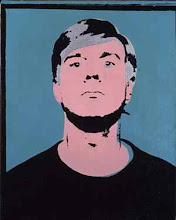 |
| Anthony Caro, Month of May, 1963 |
The coincidence of these exhibitions of Caro with those of Barbara Hepworth at Tate Britain (see below) and Henry Moore, also at YSP (see below), makes for an interesting comparison of the (arguably) major British, twentieth century abstract sculptors. Caro's innovatory, painted, welded sculptures of the 1960s represented a spectacular and radical turning away from the 'humanist', organic, carved work associated with Moore and Hepworth.
As noted in the entry marking his death in 2013 (see below) Caro (having worked as an assistant to Moore) was profoundly influenced by the work of the Abstract Expressionists and, in particular, by the work of sculptor David Smith and the ideas of Clement Greenberg experienced during a visit to the United States in 1959.
I like Adrian Searle's description of an encounter with Caro's best work: "[They] dance in front of you and you have to dance with them and around them. This involves lots of sidling and bending, squats and pirouettes, circling and shimmying."
Personally, I like the painted work of the 1960s the best - it still seems fresh and lyrical.
Read reviews by Adrian Searle, Mark Hudson, Jackie Wullschlager, Karen Wright, Louisa Buck and William Cook.
 |
| Anthony Caro, Twenty Four Hours, 1960 |
 |
| Anthony Caro, Sculpture Seven, 1961 |
 |
| Anthony Caro, First National, 1964 |
 |
| Anthony Caro, The Window, 1966-7 |
 |
| Anthony Caro, Double Shot, 1987-93 |
 |
| Anthony Caro, Forum, 1992-4 |
 |
| Anthony Caro, Promenade, 1996 |
 |
| Anthony Caro, Morning Shadows, 2012 |
 |
| Anthony Caro, Rhapsody, 2011-12 |
 |
| Anthony Caro, Terminus, 2013 |
 |
| Anthony Caro, End of Time, 2013 |



No comments:
Post a Comment